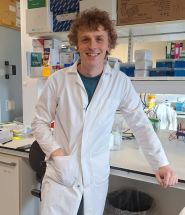
The Lady Edith Wolfson Fellowship Programme attracts and develops the careers of outstanding young Clinical and Non-Clinical researchers in order to create the future scientific leaders in the field of MND Research. Find out more about our current fellows below.
Clinical Research Fellowships
The first Clinical Fellowship was awarded to Professor Martin Turner (who was Dr Martin Turner at the time) from the University of Oxford in 2008. The Clinical Fellowships are funded in a partnership with the Medical Research Council (MRC).
Dr Richie Patani (University College London and The Francis Crick Institute)

Dr Patani’s lab will use human induced pluripotent stem cells (iPSCs) to generate neuronal and glial cells from patients with ALS and healthy volunteers, to work out the earliest molecular events of the disease. Rickie's group specifically focuses on three main areas: i) how abnormalities in RNA transcript structure lead to abnormal RNA-protein interactions to cause ALS; ii) how glial cells of the brain – known as astrocytes – contribute to motor neuron degeneration and iii) how cellular ageing interfaces with the disease process.
Find out more about this research
March 2019 - February 2024
Dr Pietro Fratta (University of Oxford)

TDP-43 is a protein important for the specific transport of RNA to different locations in the axons and in the response of cells to stress and damage. This project will combine novel mouse models and patient cell lines to investigate how TDP-43 impacts the response of motor neurons to damage in the axons, and the relevance of this response pathway in ALS. It will help to understand how changes in TDP-43 impact motor neuron survival. This information will be essential to develop effective therapeutics.
Find out more about this research
October 2019 - September 2024
Dr Alex Thompson (University of Oxford)

The project aims to study people carrying genetic alterations that predispose to MND in the years before symptoms begin. By measuring the levels of thousands of proteins in cerebrospinal fluid – the fluid closest to the cells affected by MND – Dr Thompson aims to detect MND-related changes occurring in the nervous system long before the start of MND symptoms. This will hopefully shed light on the mechanisms that lead to the development of MND, paving the way for new therapies, and develop ways of predicting when MND will begin in order to allow earlier treatment of MND – even before symptoms develop.
Find out more about this research
April 2020 - April 2025
Previous Clinical Research Fellows
- Prof Martin Turner (University of Oxford) | August 2008 - July 2013 and August 2013 - August 2018
- Dr Robin Highley (University of Sheffield) | February 2009 - January 2012
- Dr Ceryl Harwood (University of Sheffield) | April 2009 - March 2012
- Dr Pietro Fratta (University College London) | Sep 2010 - August 2013 and April 2015 - March 2019
- Dr Johnathan Cooper-Knock (University of Sheffield) | September 2012 - September 2015
- Dr Jemeen Sreedharan (University of Massachusetts Medical School and the Babraham Institute) | June 2013 - February 2018
- Dr Jakub Scaber (University of Oxford) | August 2013 - August 2016
- Dr James Bashford (King's College London) | October 2016 - September 2019
- Dr Emily Feneberg (University of Oxford) | October 2017 - August 2019
- Dr Arpan Mehta (University of Edinburgh) | August 2017 - January 2021
An additional Clinical Fellowship was co-funded with MND Scotland and the Scottish Government Chief Scientist’s Office:
- Dr Danielle Leighton (University of Edinburgh) | August 2015 - August 2018
Non-Clinical Fellowships
The first Non-Clinical Fellowship was awarded to Dr Russell McLaughlin from Trinity College Dublin in 2016. The Non-Clinical Fellowships are funded solely by the MND Association.
Dr Gareth Wright (Previously at University of Liverpool, now at University of Essex)
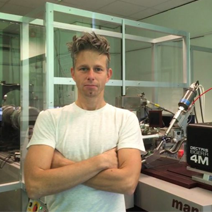
Dr Wright will search for drug molecules that help SOD1 protein fold properly and create synthetic proteins that destroy misfolded SOD1 using the cellular recycling system. Ultimately, the project will help us understand what causes those instances of MND where SOD1 misfolding is present, and find new ways to remove it.
Find out more about this research
April 2019 - March 2024
Dr Tatyana Shelkovnikova (Previously at Cardiff University, now at University of Sheffield)
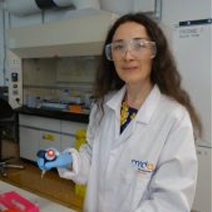
An RNA molecule called NEAT1 forms the scaffolding of small compartments in a cell’s nucleus (the paraspeckle). It has been suggested the way NEAT1 is created may be altered and that these changes might be common to both sporadic and familial MND, and differentiate them from frontotemporal dementia. 'Dr Shelkovnikova's project will model changes in NEAT1 in neurones and observe how such neurones respond to stress and toxicity.
Find out more about this research
September 2018 - June 2024
Dr Zsofia Laszlo (University of Dundee)

Glial cells, a type of cell found in the brain and spinal cord, help to ensure that neurons are functioning correctly and maintain connections between neurons and muscles. In some neurological diseases, glial cells become toxic and consume synapses (connections which enable messages to be sent from one neuron to another to be passed to the muscles) causing these connections to be lost. This project aims to investigate the link between toxic glial cells and synapse loss in MND using cell models and brain tissue to observe the action of the toxic glial cells on synapses. It will provide new insights into the role of glial cells in MND and may potentially highlight ways to delay or prevent synapse loss which could help to slow the progression of the disease.
Find out more about this research
February 2022 - July 2024
Dr Hamish Crerar (University College London and The Francis Crick Institute)
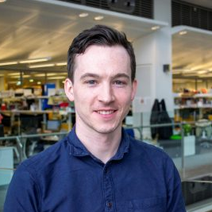
While research into MND has improved our understanding of what is changing within the motor neurons in the disease, current knowledge of why these changes occur is limited. One of these changes is the incorrect processing and placement of a molecule called RNA, which is a photocopy of DNA that is used to make proteins in cells. The main aim of this project is to investigate whether a class of small RNA molecules, known as miRNA, are affected in MND and, if they are, whether they are a cause or consequence of the disease. Identifying the miRNA molecules affected in MND and how they change could help to reveal a potential treatment strategy.
Find out more about this research
August 2022 - August 2024
Dr Ahmad Al Khleifat (King's College London)

Currently, we do not know the best way to subgroup and classify neurodegenerative diseases since overlapping disease mechanisms are often not taken into account. This project involves reclassifying these diseases based on a combination of biological measures. This will include genetic profile, epigenetics (a system controlling whether genes are switched on or off) and the level of a nerve protein found in the blood called neurofilament. The variations of these three areas will be analysed for both MND and Frontotemporal dementia (FTD) and machine learning will then be used to find patterns that correspond to different subgroups. If this allows for the formation of new subgroups, these can be used group people with MND together for clinical trials and to understand the underlying biology of the conditions.
Find out more about this project
January 2022 - September 2024
Dr Roisin McMackin (Trinity College Dublin)
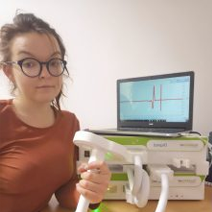
MND affects people in different ways, with symptoms emerging and progressing at highly variable, unpredictable rates. Therefore, some treatments may work in some people with MND but not in others. It is now established that those with the disease often experience cognitive and behavioural problems. The aim of this project is to develop ways to measure brain function changes that can predict patient symptoms and improve understanding of the biology of why MND has different effects on different people. This is expected to facilitate earlier, more informative diagnoses and improve detection of effective therapies in clinical trials.
Find out more about this project
April 2021 - September 2024
Dr Nicol Birsa (University College London)
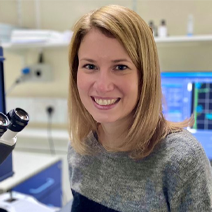
FUS is a protein that regulates the production of other proteins and is known to be dysfunctional in MND. This project aims to understand how the disruptions to protein production caused by FUS alter the function of nerve cells and their connection to muscles. Once it is understood how nerve cells are damaged, the project will move on to investigating if it is possible to correct this damage. Understanding the changes to nerve cells in MND is crucial to designing new and effective treatments.
Find out more about this project
September 2022 - August 2025
Dr Rebecca Saleeb (University of Edinburgh)

Some cases of MND are caused by a build-up of a protein called TDP-43, which clumps together to form toxic “aggregates”, leading to motor neuron damage and death. The differences in symptoms and severity between people with MND may be partly due to differences in aggregates of TDP-43. A custom-designed technology has been developed that allows the features of aggregates to be seen in high levels of detail so they can be characterised by similar features. Dr Saleeb’s project will use this state-of-the-art technology to characterise the differences between different TDP-43 aggregates in post-mortem tissue. This information will be used alongside knowledge of how the disease developed to identify different aggregate types and investigate their use as early markers of disease prognosis.
Find out more about this project
April 2023- March 2026
Dr Ross Byrne (Trinity College Dublin)

Some people with MND experience cognitive or behavioural symptom and also have frontotemporal dementia (FTD). Previous research has suggested that these symptoms may have a genetic cause. However, currently little research has been done to identify which genes and pathways might be involved. Dr Byrne’s fellowship project will analyse data from the largest studies of genetic factors contributing to MND and cognitive symptoms to identify shared genetic factors (which contribute to both cognitive decline and MND) and distinct genetic factors (which contribute purely to motor symptoms in MND). It is hoped that this could help with grouping people with MND for clinical trials, and in understanding the causes of cognitive symptoms in MND.
Find out more about this project
September 2023- August 2026
Dr Tobias Moll (University of Sheffield)
Tiny structures on the surface of brain, called membrane lipid rafts, play an important role in this communication. Previous research has shown that these structures do not work properly in models of a specific genetic type of MND, called SOD1 MND, and that the function of the rafts could be boosted using a protein (caveolin-1) which protects nerve cells. Dr Moll's research aims to investigate if membrane lipid rafts are also faulty in other genetic types of MND and test whether increasing the production of caveolin-1 could reduce damage to nerve cells.
Find out more about this project
April 2024 - March 2027
Dr Yiran Wang (University College London and the Francis Crick Institute)
Some proteins can become ‘lost’ in MND and move from the nucleus of the cell, where they should exist, to another part called the cytoplasm. This movement of proteins mean that they are no longer able to function as they should and this can have many effects including the corruption of RNA messages created from DNA. Dr Wang's fellowship project will use cell models of MND to understand more about the biological mechanisms that underlie the misplacement of proteins within neurons. It will also look at how these mechanisms might contribute to the development and progression of MND.
Find out more about this project
May 2024 - April 2027
Dr Daniel Solomon (King's College London)
In the most common form of genetic MND, C9orf72, the gene changes lead to the production of toxic proteins called dipeptide repeat proteins (DPRs). These toxic proteins disrupt the movement of other proteins between different parts of a motor neuron. TDP-43 is one of the proteins which is impacted by dipeptide repeat proteins and is thought to play a key role in motor neuron death. TDP-43 gets stuck in the wrong area of the motor neuron and becomes faulty. Dr Solomon's fellowship project aims to understand why dipeptide repeat proteins disrupt the movement of proteins like TDP-43 and if there is a way of correcting their movement in MND.
Find out more about this project
July 2024 - June 2027
Previous Non-Clinical Research Fellows
- Dr Scott Allen (University of Sheffield) | January 2016 - March 2019
- Dr Martina Hallegger (University College London) | January 2016 - December 2019
- Dr Ashley Jones (King's College London) | March 2016 - August 2019
- Dr Russel McLaughlin (Trinity College Dublin) | January 2016 - September 2019
- Dr Matt Gabel (Previously University of Sussex, now at the University of Oxford) | July 2017 - June 2019
- Dr Patricia Gomez-Suaga (King's College London) | May 2018 – July 2021
- Dr Barney Bryson (University College London) | August 2017 - September 2022
- Dr Andrew Tosolini (University College London) | November 2021 - April 2023
- Dr Daniel Scott (University of Nottingham) | August 2019 - January 2024
